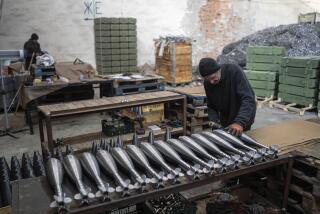More Armored Vehicles in Works
WASHINGTON — The Army moved Friday to boost production of armored Humvees for American troops in Iraq by 100 a month, despite recent assertions by Defense Secretary Donald H. Rumsfeld that soldiers could not be supplied with safer vehicles because Pentagon officials could not procure them any faster.
The steps to increase production came two days after Rumsfeld bluntly told troops being sent to combat that assembly lines installing armor on the vehicles were already operating at maximum capacity.
The developments could further embarrass the Bush administration, which for more than a year has not come up with enough equipment to protect U.S. troops in Iraq from a deadly insurgency that war planners failed to anticipate.
Pentagon officials confirmed that the Army had entered negotiations to secure more armored Humvees, but they did not explain why officials had said before Friday that production could not be increased.
Meeting with troops in Kuwait on Wednesday, Rumsfeld was asked by a Tennessee National Guard member why troops were forced to rummage through scrap yards to find metal to protect their vehicles. Rumsfeld told the soldier, Spc. Thomas Wilson, that “a matter of physics” prevented U.S. plants from stepping up production of armored Humvees.
On Friday evening, Armor Holdings Inc., a Jacksonville, Fla.-based company that produces and installs armor for Humvees, said it had been contacted by the Army and would boost production to about 550 armored Humvees a month from the current 450. The company’s statement came at the end of negotiations that began Friday morning when Army Secretary Francis J. Harvey telephoned Armor Holdings President Robert Schiller.
The company expects to reach the new production level by February or March 2005. The armor plating costs the Pentagon $58,000 for each vehicle, company spokesman Michael Fox said.
The military has about 5,900 armored Humvees in Iraq, but U.S. commanders have told Pentagon officials that they need 2,000 more.
AM General, an Indiana-based company, manufactures the Humvees. The vehicles are shipped to Armor Holdings’ plant in Ohio to have the armor plating installed. A spokesman for AM General said the company might be able to produce 550 vehicles a month in about six weeks.
AM General may hire more employees to meet the demand, or could reduce its commitment to the other military branches in order to meet the Army’s demands, said Lee Woodward, the spokesman.
“I’m not sure yet how it will get done,” Woodward said. “They’re kind of scrambling around today.”
News about the increased production Friday contradicted what Rumsfeld and top military commanders had told the troops on Wednesday and then restated at a media briefing Thursday.
“It isn’t a matter of money,” Rumsfeld had said. “It isn’t a matter on the part of the Army of desire. It’s a matter of production and capability of doing it.”
The next day, the top U.S. commander in Kuwait echoed Rumsfeld’s remarks to the troops about production constraints.
“You’re producing vehicles and a certain amount of law of physics is involved here,” said Lt. Gen. R. Stephen Whitcomb. “It’s not necessarily just money; it’s a production capacity to be able to build more.”
Even with the boost in production of armored Humvees, the Pentagon still faces critical shortages of armor for its medium- and heavyweight trucks that ferry food, fuel and supplies to troops across Iraq.
According to the House Armed Services Committee, only 10% of the 4,814 medium-weight transport trucks and 15% of 4,314 heavy trucks are outfitted with bullet-resistant armor.
Some troops in Iraq have jury-rigged their trucks with sand bags and plywood to protect themselves from insurgent gunfire and explosions.
In Iraq, lack of armor on the heavy trucks has caused friction between troops and commanders. In October, a logistics company of Army reservists refused an order to carry out a resupply mission to a base in northern Iraq, saying that driving large unarmored vehicles on Iraq’s deadly highways amounted to a “suicide mission.”
After an investigation, 23 members of the unit were given nonjudicial punishments, which could entail a reduction in rank and loss of pay.
During the meeting with soldiers in Kuwait, Rumsfeld also faced tough questions about why regular troops received better quality equipment than National Guard and reserve soldiers, and about the Pentagon’s “stop-loss” policy of keeping troops on duty after their commitment to the military expired.
A Chattanooga, Tenn., newspaper reporter traveling with Spc. Wilson’s unit has told colleagues that he helped Wilson craft the armor question.
Rumsfeld’s answers brought a flurry of angry responses from both Democrats and Republicans, some of whom called for the Defense secretary’s resignation.
On Friday, the former Democratic presidential nominee, Sen. John F. Kerry (D-Mass.) wrote to Rumsfeld, asking why the Pentagon wasn’t buying more armored Humvees when companies said they were not yet at full production capacity.
“I know you agree that no soldier should be put in harm’s way without adequate armor,” Kerry wrote.
“I urge you to investigate immediately why troops are going without the equipment they need when American companies say they can provide it.”
Lawmakers applauded the disclosure that the Army was going to buy more armored Humvees, but chastised the Pentagon.
“It’s a very welcome decision,” Sen. Edward M. Kennedy (D-Mass.) said in a statement. “Spc. Wilson deserves a medal for shaking the Pentagon tree so effectively and producing this long-needed increase so quickly. Shaming Secretary Rumsfeld is a small price to pay for saving many troops’ lives.”
More to Read
Start your day right
Sign up for Essential California for news, features and recommendations from the L.A. Times and beyond in your inbox six days a week.
You may occasionally receive promotional content from the Los Angeles Times.






